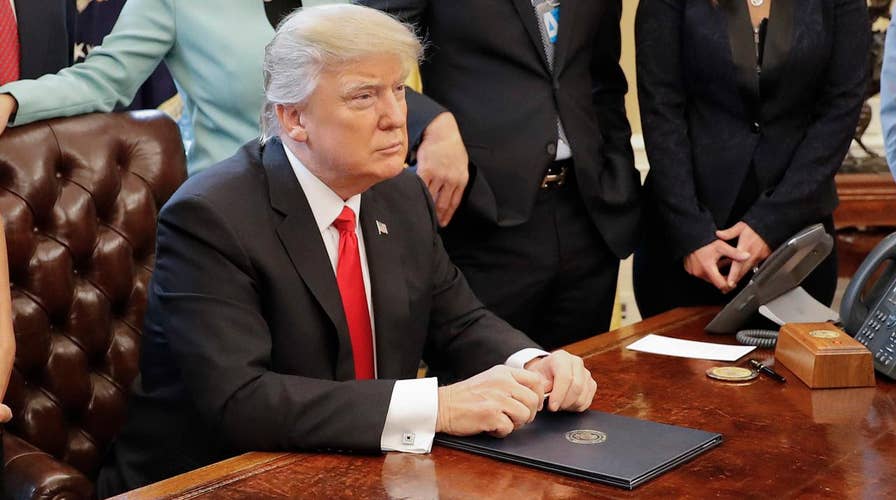Travel ban rollout sparks concerns about the White House
Did the administration miss the opportunity for a smoother rollout?
Munther Alaskry and his family were just hours away from their dream as they boarded the final leg of a flight to the United States after waiting seven years for visas. But minutes after sitting down, they were yanked from the plane because President Donald Trump's immigration order banned Iraqis from entering America.
PENCE: 'ANY FAIR-MINDED PERSON' WOULD UNDERSTAND TRUMP'S IMMIGRATION ORDER
Alaskry's wife started to shake. Their son cried, and his 7-year-old daughter asked through tears: "Why the Americans don't want us?" The Iraqi engineer who bonded with Marines over a shared love of Metallica and cleared away roadside bombs for U.S. troops did not respond. He didn't know the answer.
"That moment our whole world broke down into pieces," Alaskry said. "It was devastating for us. We felt like we lost everything. We lost our dreams."
STATE SAYS FEWER THAN 60,000 VISAS REVOKED UNDER ORDER
On Friday, Alaskry and his family arrived at New York's Kennedy Airport after the Trump administration reversed course and said he and other interpreters who had supported the U.S. military could come to America. They spent nearly a week in limbo in Baghdad, thinking their hopes of starting a new life free from death threats had been shattered.
The family did paperwork for more than five hours after landing in New York, but Alaskry said they were treated well.
"I'm very blessed to be here," he said.
Alaskry is among nearly a dozen Iraqis interpreters who told The Associated Press they were taken off planes or were told their flights were cancelled after Trump's Jan. 27 order, which banned refugees from Syria and suspended travel into the U.S. from Iraq and six other Muslim-majority countries.
Initially included in the order were Iraqis who had received special immigrant visas because they worked for the U.S. government during the war. Among them were Alaskry and a 26-year-old man who had worked for the State Department vetting Iraqis contractors. After combat veterans, including members of Congress, criticized the decision, U.S. officials announced the former interpreters would be exempt from the ban.
"We can't accomplish our war effort without these people, which is why we need to protect them," said former Army Capt. Matthew Zeller, of the nonprofit No One Left Behind, an organization helping Alaskry and other interpreters resettle in the U.S.
Alaskry first started working for the U.S. military in 2003 after meeting Marines in the streets of Baghdad. He later translated for the Army and National Guard and then cleared away bombs. In 2005, he fled to Jordan after a threatening letter was left hanging from his car door.
He returned to Iraq and got a job with an Iraqi company that supported K-9 teams for the U.S. mission and later worked for a U.S. government-funded project that provided information on health care and trauma to Iraqis displaced by the fighting.
All the while, he waited for his visa to the U.S., hoping to raise his children in a safe place. He applied when his daughter was a year old, and was still waiting four years later when his son was born.
Meanwhile, he and his family limited their outings, afraid of the violence and crime.
After hundreds of emails, multiple interviews and medical exams, he got the call in December. The visas were ready. Alaskry promised his daughter that she would finally see Disneyland.
The 37-year-old engineer quit his job, sold his car and belongings and bought their plane tickets, spending $5,060.
They had a two-hour layover in Turkey on Jan. 28 before boarding a connecting flight to Houston. They were on the plane 15 minutes, with his children watching cartoons, when the Turkish authorities arrived and told them to get off.
"My daughter kept asking me, "Why the Americans don't want us in America? You promised me you will take me to Disneyland. Why can't you take me to Disneyland?" he said.
The family was sent to a special security area at the airport in Istanbul for people who have no visa to enter Turkey and are denied entry to their destination country.
Alaskry got online and bought four more tickets back to Baghdad, spending $460. The family spent 13 hours at the airport, sleeping in seats. They flew back to Baghdad the next morning, sitting in silence in a taxi as they went to his in-laws' home.
"I felt so alone," Alaskry said.
Then he turned on the TV and saw the protests at U.S. airports.
"Every time I see those people protesting on the news, I cry," Alaskry said. "It's touching to me. These people don't know me. They don't know my story, though there are hundreds like me who supported the American troops."
Alaskry said he was happy when Trump was elected because he believed he would help Iraq get rid of the Islamic State group.
"I just want to tell Mr. Trump, President Trump: 'We are your allies,'" he said. "Please let us be your friends. We want to be your friends. Don't let the Iraqi people down. We look to America like it is our big brother."
Alaskry got a call Wednesday from the U.S. embassy in Baghdad that he could now travel to the U.S. The person did not say if a mistake had been made or offer apologies. He bought four more tickets, spending a total of $8,000 on all the airfare.
He feels sad for his fellow Iraqis who are barred but is happy to get his family out.
"I'm excited to come to the States," he said. "I know American values. I work with brave American soldiers. I ride with them in Humvees. The American people are great people. I love them no matter what."


